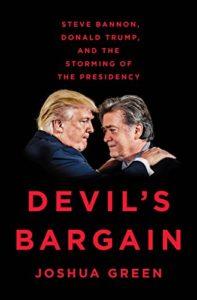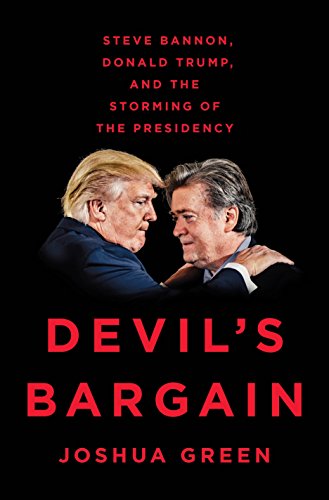
Donald Trump has been in the White House for six months as I write. His approval rating today (July 25, 2017) stands at 38.9%, according to an average of national polls on Nate Silver’s widely read blog, FiveThirtyEight. His disapproval rating is nearly 20 points higher. These numbers establish him as the most unpopular president since World War II as measured six months into his term (although Gerald Ford came close because of his pardon of Richard Nixon).
Estimated reading time: 5 minutes
Meanwhile, Trump’s major initiatives—the ban on Islamic refugees, the plan to build a border wall and make Mexico pay for it, the pledge to spend $1 trillion on rebuilding infrastructure, and the effort to repeal and replace the Affordable Care Act—have all failed to gain traction so far. Given all that, combined with his proclivity to lash out in fury at friend and foe alike, Donald Trump has become the Republican Party’s worst nightmare (not to mention the rest of us).
Devil’s Bargain: Steve Bannon, Donald Trump, and the Storming of the Presidency by Joshua Green (2017) 288 pages ★★★★☆
The new book Devil’s Bargain: Steve Bannon, Donald Trump, and the Storming of the Presidency by BloombergBusinesweek senior national correspondent Joshua Green attempts to explain both why the notoriously self-promoting developer and reality-TV star came to be in the White House—and why his presidency is failing. The case Green makes, singling out alt-right provocateur Steve Bannon for a large measure of the responsibility, is persuasive if not entirely convincing. He writes, “Trump needed him. Practically alone among his advisers, Bannon had had an unshakable faith that the billionaire reality-TV star could prevail—and a plan to get him there.”
At another point, Green notes that “Trump wouldn’t be president if it weren’t for Bannon.” However, whenever an analyst looks for a single explanation for a complex historical event, it’s always best to view it with a skeptical eye. History is rarely so easily explained. If there is anything close to a single explanation for the chaos, incompetence, and amoral behavior in the White House, it lies in the singular personality of Donald Trump himself.
Three stories woven together
In Devil’s Bargain, Green weaves together three stories: the unfolding of Trump’s presidential campaign before Steve Bannon took charge during its last two months; how Bannon came to hold the extremist beliefs he professes; and how the relationship between Trump and Bannon grew, matured, and eventually cooled. The focus is on the election campaign, with an insider’s description of the Trump campaign on election night, November 8, 2016, opening and closing the book. Green writes well, star journalist that he is. Though a good deal of what he writes has come to light in press reports during the past year and a half, Green tells the tale well. It’s full of personal observations that could only have come from the players themselves.
In a recent post, Why Hillary Clinton lost the 2016 election, I reviewed Shattered, two other journalists’ take on the election, but from the perspective of the Clinton campaign. Jonathan Allen and Amie Parnes found the explanation for Clinton’s loss in the character and the conduct of the candidate herself. By contrast, Green leans toward viewing Steve Bannon as primarily responsible for Trump’s victory. Just as Allen and Barnes overlooked the four decades of the country’s steady drift rightward, Green seems to underestimate the role Donald Trump himself in winning the presidency. It’s clear to me that Trump possesses limited intelligence, but he is unquestionably shrewd and manifests unusually sharp political instincts (even if he doesn’t often follow them as president).
“Trump believes very little of what he says”
In Green’s view, Bannon believes most of what he professes. He seems to think that Trump believes very little of what he says. For example, Green observes that when Trump met Bannon, “his views changed. Trump took up Bannon’s populist nationalism.” At another point he notes, “Trump ran against the Republican Party, Wall Street, and Paul Ryan, but then took up their agenda.” Certainly, Trump’s views have flip-flopped again and again, and Green documents many specific instances in which Trump clearly took a stand on an issue strictly because it helped advance his campaign. But Green overlooks the pattern of Trump’s virtually nonstop lying. It’s difficult to tell whether the erstwhile reality-TV star believes in anything at all other than his own importance.
Devil’s Bargain may not be the last word on one of the most important presidential elections in American history. But in the absence of anything even more authoritative, it’s an excellent beginning.
For related reading
Given my interest in US politics, it will be no surprise that Devil’s Bargain and Shattered are not the only books I’ve read about the contemporary political scene. For my review of another, John Judis’ The Populist Explosion, see Donald Trump: populism, or fascism? (This is one of 15 books about Donald Trump and his impact on American democracy.)
Two others are at How the Koch brothers are revolutionizing American politics and Al Franken’s memoir is revealing, insightful—and funny.
This is one of the Good books about billionaires.
And you can always find my most popular reviews, and the most recent ones, on the Home Page.



























